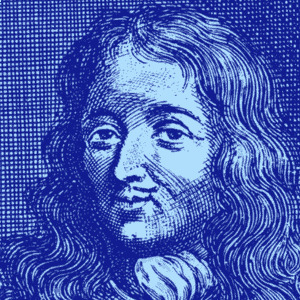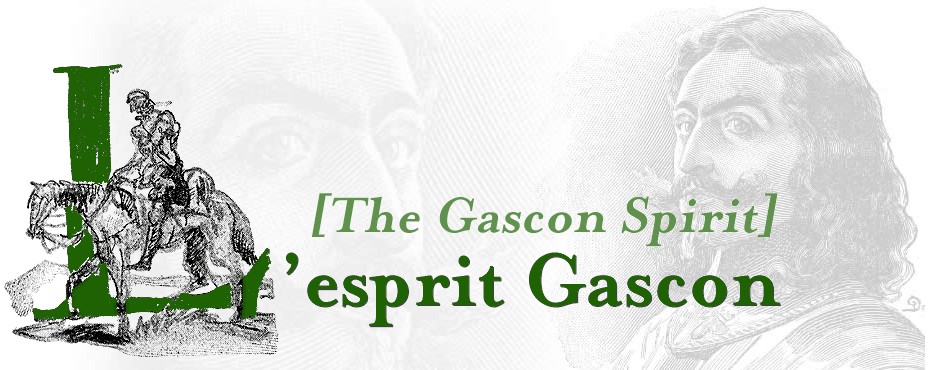
From the sixteenth to the eighteenth centuries, anyone who spoke a langue d’Oc, one of the languages of the south of France, was (with the exception of the inhabitants of Provence) unjustly labeled a “Gascon”.
In military circles, however, one did not make this mistake, and the only Gascons that one spoke of were those who actually hailed from that province of the far southwest, known as a “breeding ground for soldiers”, a reputation that it would continue to enjoy for centuries. For even Napoleon would say, “Give me an army of real Gascons, and I’ll cross a hundred leagues of hell!”
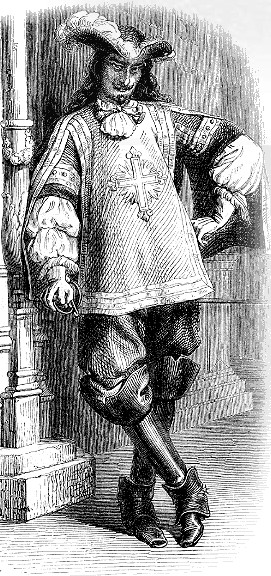 The greatest commanders recognized the Gascons’ merit on the battlefield and when one spoke of them, it was always with respect for their courage and their daring. Because they were such fearless warriors, the Gascons quickly became part of the royal entourage, and they were the first to be integrated into the king’s guard. The reigns of Henri IV, Louis XIII and Louis XIV saw the apogee of the King’s military house, and, consequently, that of the Gascons, too.
The greatest commanders recognized the Gascons’ merit on the battlefield and when one spoke of them, it was always with respect for their courage and their daring. Because they were such fearless warriors, the Gascons quickly became part of the royal entourage, and they were the first to be integrated into the king’s guard. The reigns of Henri IV, Louis XIII and Louis XIV saw the apogee of the King’s military house, and, consequently, that of the Gascons, too.
But the Gascons had a very different personality compared to the inhabitants of the capital of the kingdom. With their arrival in Paris, these boisterous men brought with them their colorfulness, and they shocked the Parisians who were unaccustomed to such displays of exuberance. And the fact that they occupied powerful posts, with access to the king and his counselors, drew the jealousy and animosity of many a northerner. In the seventeenth century, in particular, the Gascons’ omnipresence in the military and political spheres of France was quite palpable. They had established their own network, and it was among the elite corps of Musketeers that they were most present. Even without the Gascons, these elite soldiers had quite a reputation in Paris. When they were not busy on the field of battle, they noisily took over the capital, making ladies swoon, fighting each other in duels, and in the taverns one could not help but notice their fondness for good food and drink.
Their singing accent, their excessive joking, their often misinterpreted boastfulness made them easy targets for a society that was becoming ever more closed and policed and embarrassed by these outbursts that it just couldn’t understand. After having been forced, grudgingly, to accept these newcomers who had become the monarch’s darlings, this same society found its revenge by making the Gascons an object of ridicule. And theater and literature became the media that created and diffused a stereotyped Gascon that became a caricature, a caricature that gradually permeated the collective imagination. Indeed, the expansive and larger-than-life personality of the real Gascon made him an easy target.
Le Gascon caricatured
A “Gascon” character appeared –as a source of comic relief—on the French stage and in literature in the seventeenth century. His traits were that of a braggart and teller of tall tales, in the lineage of the matamore of Spanish comedy or the capitan of the Italian Comedia dell’Arte. However, in contrast to his predecessors, this buffoon was a little less excessive and, more importantly, French (or rather, Gascon). This new character became a real success with the public.
“And so, at the end of the seventeenth century, the Gascon became one of the indispensable elements of the comedy-farce and comedy of intrigue; speaking with an accent –according to conventional pronunciation, often noted in the text itself: é for e, v for b, b for v, u for eu, etc.—it is necessary to employ a particular actor for the role (…) During the eighteenth century, his traits become sharper: false noble, touchy when it comes to his honor, a scrawny character hungry for money; he is also a suave and clever fellow, a braggart who lies due to a vivid imagination and who stakes his self-worth on his ability to twist the truth better than anyone without ever getting caught.” André Tissier.
Strangely, it was King Henri IV himself who, in the beginning, was responsible for the reputation of the “Gascon”, whether on stage or through casual jokes.
“The Béarnese [king] even found a keen pleasure in this. He loved to have his actors put on a farce full of grotesque mimes and a plethora of hysterical lines; this was the ultimate farce of the ‘Gascon gentleman’.” Véronique Larcade.
But when it came to this gentle mocking, Henri IV, as well as Roquelaure, his Gascon counselor and friend, could have said, like Edmond Rostand’s character Cyrano:
I serve them myself with considerable verve,
But I do not permit another them to serve,
That is, what the king said in jest was not tolerated from another. Because, if the king and his counselor thoroughly enjoyed seeing the Gascon’s character traits exaggerated on stage, it was out of warm feelings towards their southern compatriots, whose qualities they recognized as much as their flaws. The king’s laughter was not one of mockery, but of complicity.
As Véronique Larcade reminds us, the Gascons liked to say that “Being Gascon means having a happy blend of virtues, brilliance and minor flaws that amuse. Everything about us brings pleasure, even our imperfections. This is probably not entirely false, because the Gascons knew, and loved better than anyone else, how to exaggerate their own flaws, to play on them, and, above all, to laugh at them.”
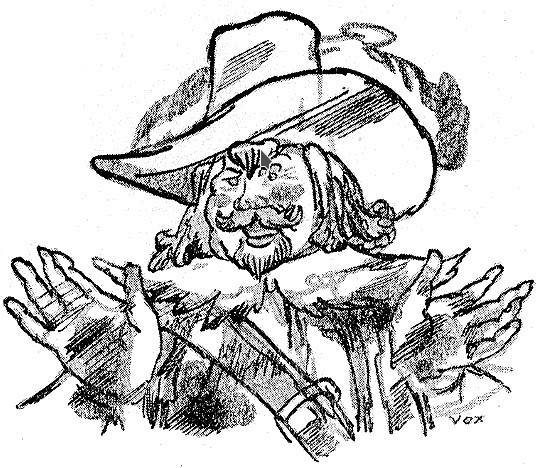
On the other hand, the author Agrippa d’Aubingé did not paint his “Gascon” with the same harmless intentions in his Aventures du Baron de Faeneste* (1617). On the contrary, he paints a Gascon that is the opposite of what Henri IV loved. “His hero is a ridiculous matamore, a paragon of the worst faults from his native Gascony. This is what allows him to highlight the books’ other protagonist: Monsieur d’Enay, as much a [man of the north] as Faeneste is Gascon, as distinguished as the other is an arrant thief, as cultivated as the other is ignorant and, of course, as much a subtle Huguenot as the other is a narrow-minded Catholic.” Véronique Larcade.
“It’s a rather colorful satire, without mercy for the flaws of Gascony, to the point of injustice (…) It must be said that the essential upbraiding, primordial, that Aubigné gives his hero is already contained in the name he gives him –a name carefully chosen, with just enough southern flavor, but that is actually the transcription of a Greek word meaning ‘to appear’.
A love for appearance, an innate need to appear in a certain light, everywhere and in all circumstances, anyhow and at any price, this is, in the end, the very depth of the Faeneste character, this is the guiding principle that becomes his operating mode.” Edouard Bourdiez.
If Agrippa d’Aubingé chose to oppose a Gascon to a northerner, it was because he himself was a northerner and his service to Henri IV (a southerner) did not bring him the rewards that he had hoped for. A confirmed Huguenot protestant, he would never forgive Henri IV for his conversion to Catholicism nor the favors that he bestowed on other members of the court, particularly the Duke of Eperonon, who was, as it turns out, a Gascon.
The Baron de Faeneste is an illustration of the very worst traits of Gascon character. With venom, Agrippa d’Aubigné transformed his character into an outrageous caricature, exaggerating to the point of dishonesty, as Edouard Bourdiez points out:
“I warn you… the novel by Agrippa d’Aubigné only gives us a caricature of the Gascon character. [This character] certainly contains some rather colorful traits and some are not entirely false. But there are many others that are blown out of proportion and are unfair. Above all, what I disagree with the most concerning Aubigné, is this kind of weakness and cowardliness with which he infused his hero. No, this could not be further from the truth. There may be cowards in Gascony, as anywhere, but it is far from being their national vice. History has sufficiently demonstrated this.”
On this point, d’Aubigné went too far because, though the Gascons may talk big, they are certainly not cowards.
Happily, successive playwrights who inserted a “Gascon” character into their work did not retain the image painted by d’Aubigné, and in the end they chose to present a character that was fairly close to the colourful Gascon that had so amused Henri IV.
“For a long time, it is true, gasconade-spouting [fictional heroes] respected the Gascons’ original, authentic traits. Their witticisms, their pleasant and spirited repartee had, along with the good King Henri, gone beyond the limits of Gascony and Guyenne. The Gascon was proud, he loved flair, he knew, as the proverb said, how to extricate himself from a sticky situation through agile manoeuvring; laughter was always with him; if someone presented himself as a Gascon, one expected him to exhibit a marvellous wit.” André Tissier.
During the seventeenth century, the Gascon made his appearance in comic novels, with the traits of a kind of wise fool, a kind of anti-hero who revealed certain truths of the time under a mask of eccentricity.
In Le Gascon extravagant, a comic novel that appeared anonymously in 1637 (and successively attributed to Louis Moreau du Bail and Onésime de Clairville), the Gascon character, who is supposed to be extravagant, turns out to be a philosopher of morality who is able to speak freely because “fools are suffered everything”. And so, while playing the fool, the character digresses only to give us a better vision of life and liberty.
These characters, these “fools” that one termed as “extravagant” at that epoch, and that populate the French novel of the seventeenth century –heir to the Spanish picaresque novel—are in reality much more intelligent and rational than they appear. To be extravagant, in the true sense of the term, is to break out of the norms established by society, to be impertinent and nonconformist. More, these extravagant characters are in reality sages, lucid and insightful, whose discourse speaks truth. The narrator himself says of his hero:
“As I heard this [Gascon] speaking, I was in a state of quasi-ecstasy and said, What a strange metamorphosis. This man speaks alternately in extravagance and then, forthwith, he makes the greatest discourse in the world: where could this change come from?” Values are inverted in this kind of novel: what appears as wisdom is insanity while what appears as insanity is true wisdom.
Even the fact that the hero is a Gascon is not an accident. He makes himself outrageous, in the colourful comic novel, in order to better mock those who seek to mock and parody Gascons. But, in the end, he is a true sage and a free man.
At the same time, as Gascony rose to a more important role in affaires of state, the character of the “Gascon” would continue to descend on the stage, his comic traits becoming ludicrous.
“The Gascons lose their real physiognomy here; from now on, we must entertain at their expense; only the caricature counts: one simplifies, exaggerates, one descends to the level of zaniness, qualities are turned in derision and foibles are turned into faults; authentic Gascons, the real Cadets of Gascony, would hardly recognize themselves in these characters.
In spite of this deformation, or rather because of it, gasconades encountered a prodigious success: there was not a single magazine nor book, at the end of the eighteenth century, that did not publish a few (…) The Gascons as a whole had now become a popular archetype with traits, for the most part, forever fixed; for amusement, it sufficed to evoke this or that trait with wit and apropos.” André Tissier.
The Gascon language and its accent
This propensity to poke fun at the Gascons also came from their way of speaking. In French, they became famous for their accent and their grammatical errors. Purists even feared that the Gascons, with their colorful expressions, might contaminate (quelle horreur!) the French language.
But, it was also King Henri IV who brought the langue d’Oc with him to Paris. The king never got rid of his Béarnese accent and was rather proud of it. And as this southern king also brought with him a number of Gascons and Navarrans, slanderers began to refer to the royal court as an “intersection of dialects”.
One century later, this strange way of speaking invaded the Company of Musketeers, as the corps was by then composed mostly of Gascons who had no intention of changing their way of expression. Tréville, Besmaux and d’Artagnan, for example, were often cited by the memoirists of the time, who made a point of referring to their rolling accent, which the former were never able to rid themselves of. Insidious remarks, ironic pamphlets and subtle jokes made their way into the literature of the epoch. But, the Gascons were too close to the king to be criticized too openly. Certain even found the Gascons’ way of expressing themselves charming. This was to be the case until the middle of the eighteenth century. In Mélange amusant de saillies d’esprit et de traits historiques des plus frappants by Lesage, we find this kind of remark: “The Gascons constantly think and express themselves singularly and in a rather pleasant manner.”
But this state of grace would not last. In 1768, Monsieur Desgrouais wrote a learned book that was very critical of what he qualified as “Gasconisms” that the Gascons must absolutely part with in order to be taken seriously.
The title is unequivocal: Les Gasconismes corrigés—Ouvrage utile à toutes les personnes qui veulent parler et écrire correctement, et principalement aux jeunes gens, don’t l’éducation n’est point encore formée (Corrected Gasconisms—A work useful for all who wish to speak and write correctly, and particularly for young people, whose education is not yet complete).
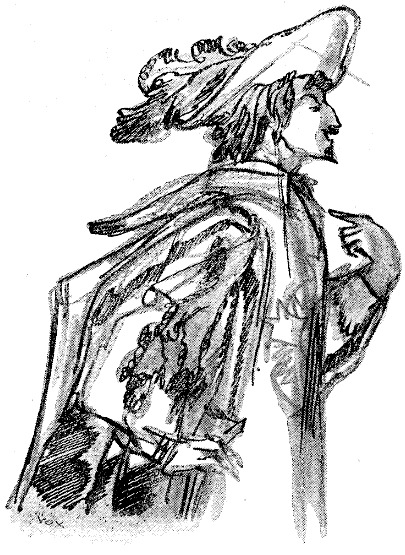
His preface begins:
“When I arrived in Paris, I was struck by the incorrect expressions, vicious turns of phrases, rather particular phrases, that is, the Gasconisms that I was hearing all over in conversations. In particular, I was surprised that no one, or at least it seemed to me, seemed to remark these errors or was as shocked as I was. But such is the force of habit, especially in this domain, that even the most educated and enlightened people let themselves be carried away to the point of not even realizing the errors they make.”
Monsieur Desgrouais goes on to say that his book is intended to give Gascons back their dignity so that they might have a tool to help them to speak correctly:
“To give an exact idea of my work, and so that one doesn’t expect more from me than what I have promised, let me warn that I do not propose to compose a grammar, nor to teach the Gascons the beauty of the French language; I do not dare raise myself to such a height. I work not so much to teach them to speak, but to not speak poorly. A mirror does not indicate what adjustments one is to make in order to seduce, rather it tells what should be removed in order to not displease. That is what my book is about. I only wish to make the Gascons aware of the Gasconisms of which they are only too familiar, and which are important for them to correct if they wish to avoid those little humiliations to which people who speak poorly are exposed, especially in Paris, where these improper expressions lead invariably to mockery of which it is always unpleasant to be the object.”
This work came at just the right time, during a period in which the Gascons were no longer in a state of grace. However, it provoked a certain number of rebuttals.
In 1771, Monsieur Mailhol wrote Lettres aux Gascons, sur leurs bonnes qualities, leur défauts, leur ridicules; leur plaisirs, comparés avec ceux des habitants de la capitale (Letters to the Gascons concerning their good qualities, their flaws, their absurdities; their pleasures, compared to those of the capital’s inhabitants). He stipulates in his preface that these letters are a response to the Gasconisms corrigés of Monsieur Desgrouais.
Beyond discourse, this book is a veritable plea. It attempts to explain the Gascon character and to justify all that might make it incomprehensible for the inhabitants of Paris.
“The Gascons generally have a quick wit, a good heart, their heads firmly on their shoulders. They lack, perhaps, enlightenment, good taste and that easy, sociable politeness that is only really known and practiced in Paris and at the Court.”
Or again:
“The Gascon, when it comes to his spiritual qualities, his knowledge, seems to bear affinities to the Frenchman or the Spaniard; ignorant, worrisome, often impolite, due to the lack of an education of which his parents did not see the value; vain, presumptuous, vaunting himself without realizing the absurdity of it, sometimes out of naiveté, sometimes because his compatriots, also out of vanity, only speak to him of his merits; but also full of imagination, sensitive, quick, enterprising, passionate, because he has never learned to quell the nature and native soil within him; finally, always ready to contradict and to take position against those who would frustrate his passions, his prejudices or even his ideas: that is, above all, the uneducated Gascon (…) But the man of letters is less imperfect where we come from (…)
Through study and the knowledge that he has acquired, he has found a reliable antidote to most of our contradictions. And yet, there rests a little, to the great satisfaction of jealous critics and their readers, and idiots.”
But, the damage was done. This resistance to the Gascons had given the capital a respite. They became the objects of derision in the theater, where their accent was parodied with a vengeance.
But there were many others who championed the Gascons’ beautiful manner of expression, full of sun, color and images!
In 1895, Louis Pepin wrote in Gasconismes et choses de Gascogne:
“An accent is due, in large part, to natural milieu, climate and latitude; it is also due to the vocal chord structure of each race; it is an inherent part of the constitution, even the character of the individual, hereditary both physiologically and psychologically.
And so, it is impossible to rid oneself of it, even if one wanted to –at least completely—but it is assuredly possible to attenuate it, to amend it over time, to modify it, in a word, through study and appropriate exercises, to meet the criteria of those whom convention has designated as the arbiters, the regulators of proper speech in all its forms; here we mean the Parisians.
And when a talented Gascon has been able to reach this objective --we all know a few examples—some will tell you, even within the sovereign Court, that his new style, although it might still betray a hint of his native soil, --and precisely, because of it—is not lacking in colour or charm.
No matter what the accent, even the worst, we do not see how, except through error on our part, it would be prejudicial to anything or anyone. Decidedly, it is not given to everyone to manipulate the gutturals of the North, and if there is no higher interest as stake, why not leave to each the liberty to play as best as he knows how the instrument that nature has given him?”
The Gascon’s rehabilitation
It is thus that the nineteenth century dawned with a rather conflicted image of the Gascon, with his competing faults and qualities. Georges Sand wrote in her Mémoires de ma vie: “The Gascons, an excellent and thoroughly slandered people…” And Balzac writes in Du notaire et de l’avoué: “There are certain classes of society that destiny has thrown to the mercy of mockers. We have thrown into the lot doctors, notaries, prosecutors, bailiffs, Normans and Gascons.”
Happily, it was Alexander Dumas who rehabilitated them, through The Three Musketeers and his other novels, in which he allowed them to renew with their veritable personality. True, they were boastful, swaggering and tellers of tall tales, but also courageous, loyal, fearless and joyful.
And although his character d’Artagnan is the best incarnation of the Gascon, Dumas doesn’t hesitate to evoke the character of other Gascons, celebrating their flaws alongside their best qualities. His books are full of references to Gascons that, though amused and cheeky, are never mocking or touched with ridicule. Below are a few examples:
- Olympe de Clèves (Chapter XXI)
“If you had only seen the charming pearl that he sold me this evening, and for nothing!”
“Ah! Let’s have a look, Father!” said Olympe with the childlike haste that all women have when it comes to jewelry.
“I don’t have it anymore,” said the Abbot.
“And what have you done with it?” asked Bannière. “Can you tell me, in front of a woman, that is?”
“Oh, my goodness!” said the abbot in a neutral tone, “I believe I attached it to one of those bouquets, and it is probably there somewhere, down in the gutters.”
The abbot said all of this with his same charming smile.
“Monsieur the Abbot is either Gascon or a millionaire”, said Olympe.
“Both,” replied the abbot tranquilly.

- La Reine Margot (Epilogue)
“Oh!” said Henri, “I don’t say that for this present foolishness; I say that for all the foolishness past and yet to come. But let’s not discuss it now, we have no time to lose.”
“And so, you’re still leaving?”
“This very night.”
“So, the business that brought you back to Paris is finished?”
“It is for you only that I returned.”
“Gascon!”
“By Saint Gris, I speak the truth!”
- Vingt ans après (Chapter XXX).
“Ah, that!” continued the Cardinal, “I believed you were Gascon, my dear fellow.”
“I am only a Gascon when I succeed, Monsignor.”
It was the right response, because [the cardinal] began to laugh.
- Vingt ans après
The cardinal smiled.
“The cadets,” he said, “that joined the musketeers under a false name in order to not compromise their family name. Long rapiers, but light purses; we know that one.”
…
“If God wills that those rapiers serve Your Eminence,” said d’Artagnan, “I dare express one desire: that it is the purse of Monsignor that become light while theirs become heavy; because between these three men and myself, Your Eminence will make all France and even all Europe tremble if he desires.”
“These Gascons,” laughed Mazarin, “are almost the equals of the Italians for their swagger.”
“In any case,” said d’Artagnan, matching the cardinal’s smile, “they are superior when it comes to handling their swords.”
- The Three Musketeers (Chapter XXI)
“Among ourselves, we say ‘Proud as a Scot’,” murmured Buckingham.
“And us, we say ‘Proud as a Gascon’,” d’Artagnan replied. “The Gascons are the Scots of France.”
Thanks particularly to Alexander Dumas, the Gascon returned to the literary scene in a much more flattering light that that of the capitan buffoon. He entered through the front door to take his place of honor in this new genre of “cape and sword” that was stoking the French imagination. Better, the Gascon was transformed from antihero into hero. From d’Artagnan to Captain Fracasse, the cadet of Gascony reclaimed his title of provincial noble, poor, there is no doubt, but full of verve, audacity, and a spirit for conquest and adventure. After having been the butt of laughter, the Gascon now makes us dream.
The “real” Gascon character
But, where lies the truth in the legend that has been left to us by literature and pictures?
Edouard Bourdiez gives us his reponse:
“You know, when it comes to the Gascon character, a lot of bad has been said, and a lot of good; in reality, both were probably true.”
On the one hand, because he has been so widely popularized according to his most outrageous traits, the Gascon continues to possess that little bit of caricature whenever he is evoked in our collective imagination. Do we not exclaim “the word of a Gascon” when we refer to a broken promise? More insidious, don’t we French refer to lies as “cracs”, often unaware that we are making a reference to the Gascon character of Monsieur de Crac en son castel, a play that was popular in the seventeenth century?
It must be said that even the official dictionaries –like that of the French Academy in 1798 or of Furetière in 1690—have done nothing to attenuate this caricature.
For the first, we read this reference for Gascon:
“We do not cite it here as the name of a Nation, but rather because it is sometimes employed to designate a braggart, a boaster. He boasts of this or that, but he’s a Gascon!”
And in the dictionary of Furetière we read:
“Braggart, boaster, quarrelsome. This man boasts of many acts of bravery; but he is a Gascon, he spins tales.”
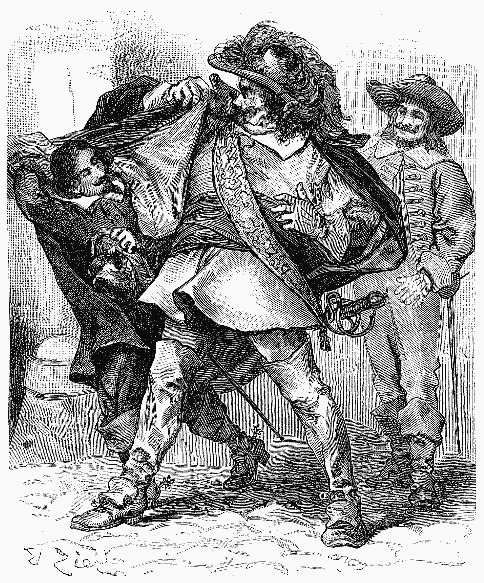
And if that is not enough, a list of avatars ensues:
Furetière (1690)
- Gasconade: “A boast about something that is quite unlikely. [IF] one says that he fought alone against three men, it is a gasconade, a boast. This is sometimes said of a swindle.”
- Gasconism: “A manner of speaking introduced by the Gascons, that comes from Gascony.”
- Gasconner [to gasconade]: “To steal with agility. I had a medal on my table, someone came in and gasconed it.”
Dicionnaire de l’Académie française, 1798:
- Gasconade: “Boasting, outrageous vaunting. This man boasts of having participated in thirty combats, but they are gasconades. He claims to be very rich, but it is a gasconade, a pure gasconade. To say or do Gasconades. He says that he could fight against ten men, it is a gasconade.”
- Gasconism: “A vicious construction of the language that is derived from the Gascons’ manner of speaking. That is not French, it is a gasconism.”
- Gasconner [to gasconade]: “To tell gasconades. It is popular and familiar.”
One notes that one does not gasconade in the same way at the Academy or at Furetière, and that, for the latter, the Gascons are likened to thieves in addition to being braggarts! If the three references cited above have since been expunged from the dictionary of the French Academy, we can still find braggart as one of the definitions for Gascon. Equally interesting, we can also find gasconade as a noun and as a verb in any English dictionary, referring to the same manner of boasting or speaking extravagantly. And even Webster gives braggart as one of the definitions for Gascon.
And so, it seems that in every caricature, there is a little grain of truth.
The Gascon tendency for big talk is not a myth, but a reality. But, it is also just the tip of the iceberg, the visible part of a truly original character that deserves our understanding before we rush to criticise. Edouard Bourdiez studied the Gascon character in a rather petulant article that appeared in the Bulletin officiel de la ville de Bordeaux in 1893, and that he entitled L’esprit Gascon. In reprising the exaggerated traits that d’Aubigné had attributed to the Gascons in his Baron de Faeneste, Bourdiez explains this legendary boastfulness thusly:
“The concern for appearance everywhere and in everything (…) supposes an instinctive vanity. And because we seek the truth here, wherever she may be, we must not deny that one finds a good dose of [this vanity] deep within Gascon character. I would go even further: I would add that, ordinarily, this lack of modesty manifests itself on the outside through a certain chattiness and exaggeration (…) ‘If you want someone to think well of you, speak well of yourself!’ Here, certainly, is a piece of advice that the Gascons have not failed to follow, and for a very long time (…) The Gascon prides himself on a lot of things. It’s not his fault. It is natural for him and –this is an important point—he does it with certain grace and even a lot of good humor, which is, after all, excusable. He was born loquacious. There is in him a certain exuberant verve which can, when it has been cultivated by a little creativity or will, transform into eloquence.”
In Les Français par eux-mêmes, we can read a Gascon’s own confession on this point:
“(The Gascon owes his fame to) his proverbial vanity, his absurdities, to his character that has illustrated this in comedy; this character, as everyone explains, is only appearance, and not reality, the effect without the cause, the form without substance, the appearance without real, as said d’Aubigné, who even went to far as to consecrate an entire book to it (…)
And so we must admit it: the Gascon is vain, swaggering, a presumptuous braggart; deep down, he is too true to himself to stop it. He is hot-blooded, [he] has a prompt imagination, strong passions, supple senses; he feels, he thinks deeply, he speaks his mind and, I was gong to say it already, his actions match his words. A delicate and developed instinct, an excessively touchy competitiveness, turbulent desires, an anxious vivaciousness excite, push and provoke him to show off, and carry him constantly forward, without reflecting too much about whether strength will serve courage, or if actions will follow words. If one sees flaws here, at least they are natural flaws; but that is also what makes heroes. This fever is never ignited in more common souls; this bold language is the accustomed prelude of great men, this enthusiasm that lifts one to the greatest heights is the same that descends to the lowest depths; a mind that can dream is able to execute, when the head speaks, the arm is ready to act.” Edouard Oubliac.
It is certain that this Gascon tendency for swagger is not banal, because it has a real potential to enflame and galvanize –oneself as much as others. Edouard Oubliac even goes so far as to say that it was this very quality that made the Gascons such valiant soldiers:
“To what measure does the Gascon back up the reputation that he has made for himself? How does he justify this valor that he vaunts? How could his pride abandon him when it comes time to act? How could we assume that he exposes himself to gross shortcomings? Where can this high opinion of himself, and that he communicates to others, take him? Throw him suddenly into the fray, he who is so swift, so effervescent, so sensitive to glory; challenge him, above all watch him, shock and awe him: what wouldn’t he do to support his boast? Who would know him so little as to doubt him? And what of other, similar exploits? Leonidas only stopped the Persians because he was committed; Condé, who was the first to break the lines of Fribourg, would never have done it if he had not said it. Presumption, one could say, is the key of every great action: jousts, demonstrations of knightly prowess had scarcely any other motive; in particular, there has never been a duel, an act of bravery, a bold enterprise, or crazy exploit that did not have for cause this sudden intoxication brought on by a thoughtless promise.”
Certainly! For all those Gascons who fought with such spirit that they became the terror of their adversaries, and that some even qualified as maniacs, they needed to have rage in their hearts and the certainty of victory. When one thinks of the distances they traveled and of the combats they won –these crusaders, these Knights of Malta, these Captains of the Wars of Italy, these Musketeers of Louis XIV, one cannot help but to bow before their legendary unbreakable will and the courage that rendered them invincible. Of course they were boastful, but as Edouard Oubliac points out, it was necessary to have a healthy dose of self-confidence in order to face such adversity. And so, we should pardon this swagger that has won so many battles for France.
As for their accent and their colorful speech that have perhaps slightly corrupted the French language, how can we hold it against them?
Léonce Couture said it well in a lecture he gave in June 1882 entitled Le Génie Gascon:
“I cannot keep myself from recognizing precisely the qualities of the compatriots of Henri IV in those traits that characterize this eminently French art, in which one excelled in the seventeenth century, and that doomsayers say is today lost: the art of conversation; spontaneity, liveliness, the ability to touch on subjects while still getting to the bottom, but without being too heavy; the unpredictable witticism that saves the day in a compromising situation; the originality of ideas and expressions that helps curb with the same equanimity criticism and praise, removing from the one all bitterness, from the other all insipidness; finally, reason, reason seasoned with gaiety and even sharpness, of a sharpness that, according to the Count de Maistre, pricks like a needle, to introduce the thread. What comforts me in this opinion is that it was the seventeenth century and the court of the great king who considered as the archetype of the perfect man of court, the most exquisite speaker, no other than our compatriot the Marshal Gramont, as well as his brother the Chevalier; unfortunately, restraint and decorum were sometimes lacking in their lively exchanges as much as in their actions, and they were considered to be insufficiently like their sister, the gentle Countess Hamilton, whose husband gave her this under-appreciated word of praise that she said what was necessary and not more.”
And it is true that the Gascon is excessive in everything.
In speech and in swagger, to give fuel to the critics; but also in daring, courage and panache, giving inspiration to soldiers, monarchs, writers and playwrights, and to all who imagine that they too are Gascons, if only for the time of a novel, a film or a play.
But, believing is not being, and the real charm of the Gascon resides in his reality, full of contradictions.
